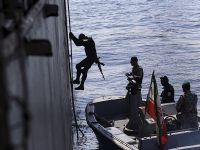War and recession fears are wrecking sentiment on world stock markets even after Wall Street took its steepest weekly slide since the Great Depression, experts say. Whether Wall Street can limit the dramatic slide when global markets reopen Monday, September 24,
But any hope of a lasting stock market recovery this year has been abandoned as President George W. Bush plans military retaliation for the September 11 terrorist strikes. "The fear of recession and geopolitical uncertainties dominate stocks," said Wells Fargo chief economist Sung Won Sohn.
"Even before the attacks, earnings were poor and the market valuation was still high," he added. "The stock market will remain depressed until layoffs stabilize and the resolution of the war on terrorism becomes clearer."
In the week since re-opening after the destruction of the World Trade Center, the Dow Jones industrials index plunged 1,369.70 points, or 14.26 percent, to 8,235.81. It was the steepest drop in the index since 1933.
Wall Street struggled to regain its footing Friday, September 21, rebounding briefly from steep early losses amid turmoil and even panic selling in some global financial markets as the threat of war and recession loomed.
Markets in Europe have suffered even bigger falls since the attacks, and Asian markets have also taken a pounding with Tokyo being driven further below its 10-year lows. In Europe, London's FTSE 100 index has dropped 600 points or 11.92 percent, to 4,433.7 since September 11.
More dramatically, Frankfurt's DAX index plummeted 882.9 points, or 18.91 percent, to 3,787.23 points and Paris' CAC 40 index slid 730.87 points, or 16.67 percent, to 3,652.87. In Japan, the Tokyo Stock Exchange's Nikkei-225 index was already at a 10-year low on the day before the attacks. Since then it has fallen another 640.7 points, or 6.3 percent, to 9,554.99.
Dealers said investors were unsettled by President George W. Bush's message apparently committing the US military to a protracted struggle of a somewhat mysterious nature.
"Market players are nervous about US military moves after the terrorist attacks," said Mitsuhiro Nakano, market strategist at Daiwa Research Institute in Tokyo. "Uncertainty over US strikes will drive away investors, pressuring sentiment." Hong Kong's key Hang Seng index has dropped 1,432.12 points or 13.82 percent, 8,934.20.
A.G. Edwards analyst Alfred Goldman said stocks "remain in a struggle as investors try to sort out the multiple uncertainties affecting earnings. The very negative mood dominating the marketplace has investors evaluating their portfolios with a two-hour outlook rather than a long-term outlook. The market will turn when investors are willing to look past the valley to peaks ahead."
The US economy and stocks may yet lead the world out of the crisis, however, economists said. "The prospect of a sustained recovery across the global economy and the world stock markets, which we had anticipated for the fourth quarter of 2001, has clearly been set back," said a report by Salomon Smith Barney economists Matthew Merritt and Shaun Roache.
But the United States was still likely to lead a recovery, they said, pointing to the unprecedented response by the US financial authorities to the crisis. The Federal Reserve has cut the federal funds target rate by half a percentage point to 3.0 percent while injecting huge sums into the financial system, a move mirrored by Group of Seven powers.
Congress has also voted to provide a $40 billion package to rebuild and respond after the devastation and another $15 billion fund for crippled airlines. "Both Europe and Japan were showing signs of cyclical earnings weakness before the attack, and we believe these two regions will not prove immune from any US setback," the Salomon Smith Barney analysts said.
"Although further monetary easing in both Europe and Japan is likely, the policy response in these areas is likely to face more constraints than in the United States," they said. Investors were advised to hold their nerve during the crisis.
"Uncertainty is now pummeling share prices," said Lynn Reaser, chief economist and senior market strategist at Banc of America Capital Management"However, valuation levels of many high-quality companies have grown even more attractive, which will ultimately bring buyers back into the market. Investors need to stay the course."
Sohn of Wells Fargo said major companies would benefit as investors scrambled into "safe haven" stocks. "Historically, economic and political crises have been buying opportunities," he added.
Looking at 17 crises ranging from President Woodrow Wilson's nervous breakdown in 1919 to the Gulf War in 1991, the stock market setback generally had lasted no more than a few months, Sohn said.
Relatively well-favored sectors included communications services, basic materials, defense, railroads, trucking, electronic/electric instruments, he added. Safe havens included drugs as well as consumer staples such as food industries. Airlines, brokerage services, insurance, travel/leisure, gaming, aerospace and retailing, however, were likely to be shunned.
In the past week, shares in AMR, the world's biggest airline group and the parent of American Airlines, dropped 39.73 percent while United Airlines slumped 44.42 percent. Over the same period, Continental Airlines is down 63.02 percent, US Airways is down 60.84 percent, Delta Airlines is down 39.68 percent and Northwest is down 47.74 percent. ― (AFP, New York)
© Agence France Presse 2001
© 2001 Mena Report (www.menareport.com)







